Somewhere along the way, a boy’s father has changed. He used to be romantic toward his wife. He used to be positive. He used to be a father figure the boy could count on. Somewhere along the way, his mind changed. He ceased to be the man the boy knew. Now, he’s temperamental. He’s erratic and unstable. He hits and scars his wife with a burning kettle. This is his nature now.
The boy, Tempest (Yared Scott), has many questions about this new man and what happened to the old one. He likens it to the sounds that cicadas make in the summer, a constant buzzing that almost serves as a warning of some kind of the things about to change. But how come that buzzing never goes away?
Charles Williams’ lyrical and hypnotic short film, “All These Creatures,” is a meditation on how those closest to us can somehow become strangers or even unrecognizable monsters. It’s a compassionate portrayal of a son coming to terms with his father who is succumbing to mental illness. The film consists largely of Tempest’s inner monologue, but when we finally see a scene of dialogue between the two characters, there is a deep sense of how they have grown so far apart. The acting and directing in this scene is quite an accomplishment in itself.
Cinematographer Adric Watson makes the most of the dark spaces in each scene. It complements Tempest’s struggle to find a light in his and his father’s darkness, and the result is a visually stunning tragedy. “All These Creatures” evokes a mood that is hard to shake off once it’s over. It’s no wonder it won the Palme d’Or at the Cannes Film Festival. It’s that good.

How did this idea come about?
It was the combination of two things in particular. I’d always wanted to convey the felt experience of growing up under a volatile or violent parent. But I wanted it to be multifaceted and portray the subtler reverberations; how it haunts your sense of self and implants all these other questions and fears.
Then, my daughter was about to be born and I was thinking about how we reevaluate our memories of our parents as we get older; how we humanize these mythic images we have. If they’re destructive it’s really necessary, I think, just to separate yourself from that impact. Maybe they were damaged themselves, or mentally ill.
So marrying these two aspects—with someone re-evaluating memories of parental trauma and trying to understand and maybe find compassion—started it off.
It seems incredibly personal. Was it hard to pare it down to a short?
It was. But I really wanted it to feel concise. The idea of bifurcating it helped. So the first half is the fractured memories and poetic perspective which then transitions into a more real time experience. The simplicity of that felt like a way to keep it contained, while also not being simplistic or one note. Also the impact of my daughter being born helped. Not because of some kind of profound change I underwent, but I think it allowed me to be more personal simply because I had a lot less time to tie myself in knots. In that state I was less ashamed of making something close to the bone.
I can definitely see certain influences here, but I’d rather you tell me who some of your influences are, if you can.
There weren’t any major influences in its inception. It felt more like I was more noticing similarities with other filmmakers’ sensibilities as it went along. I could see something of the Dardennes and Malick and Cassavetes, but almost from the outside.
There’s the difference between influences and references too though. For example there was some inspiration I felt from the Safdie Brothers, but I don’t think it’s referenced in the film in any literal way. Then there were references that didn’t necessarily inspire the film, but helped articulate the kind of lexicon I was searching for, like Tarkovsky with my cinematographer, or Harmony Korine with my Production Designer.
One example that was hard to reference was the voice over, which is of course so crucial. I thought of “Badlands” initially, I liked the innocence of that but without the irony of it being kind of a romantic diary entry. I wanted something more broken and curious. Later I found this little bit of voice over in the documentary “Streetwise” that had this unaffected but very moving quality, so that was really valuable.

How did you go about casting the film?
Firstly I felt we just needed to find the boy in the film and cast around him. The father’s role has a lot more range, but the boy’s role is so innate and required qualities I knew would be very hard to find in someone so young, so that had to take precedence.
I felt if I could find the right soul, regardless of their background, I could re-write the script around them. So I made the decision to cast without restrictions on race. When I suggested this to my casting agent (whom I thought would hate the idea) she suggested opening up gender too! So we just looked for anyone who had the right soul in that pre-adolescent range.
It was through this that we found Yared Scott, who had Ethiopian Australian heritage. So I brought on four different Ethiopian Australian advisors, to make sure what I was doing was accurate and sensitive to their culture. All of whom were enormously supportive and generous.
Then we were very lucky to find Mandela Mathia who plays the father, he was studying acting at NIDA in Sydney. Also Helen who plays the mother, who my casting agent found. Then I cast the other roles through a mixture of street casting and open auditions
I eventually cast someone just to do the voice over as well. Yared had all of the right visual presence for the role, but I needed something else for the voice which was it’s own thing. I eventually found this great kid, Melchisedek Nkailu. He had never done any kind of performing before, but had exactly the voice I was looking for and over many hours we managed to piece it together.
What were some of the challenges you had during production?
I had a producer that disappeared about two weeks before filming … and then I realized she had perhaps exaggerated some of the commitments that had been made. So that was a challenging start! But it was all difficult. I had a great cast, but most of whom were untrained child actors, which meant short shooting days as well, then bugs, driving scenes, shooting on film, one animal in particular—and all with everyone donating their services and working for free. So nothing came easy and I’m incredibly grateful for the help we had.
You can never fully anticipate the challenges. For example, I went to do a day of pick-ups a month after our shoot and our main location had been bulldozed to the ground! A lot of these challenges come down to budget, which forces you to roll the dice a lot.
Have you had any reactions from anyone who could relate to it in some way?
I have had many people relate to the film, not just in terms of the literal situation the boy is in, though there has been that. A lot of people have connected to the themes and the understanding of trying to come to terms with a volatile parent, and their memories of their private childhood fears. It’s been really wonderful to see it connect like that.
What’s next for you?
There’s a feature I’ve been writing called “Inside,” which is in some ways an extrapolation of the short, but in a different environment. I’m hoping to shoot that next year. There’s also another feature called “Kingdom Come.” It’s US set, based on a true story that happened there at the end of the ’70s. I’ve been obsessed with that story for years, so that’s something I’m looking forward to as well.
If I can, I just want to say thanks for this interview. I love this website and miss Roger Ebert’s presence in our culture deeply. He had a profound talent and was very generous in making it accessible. He’s both a reference and an influence.












